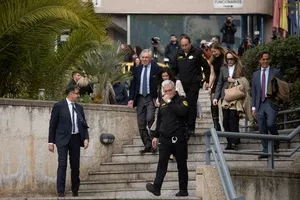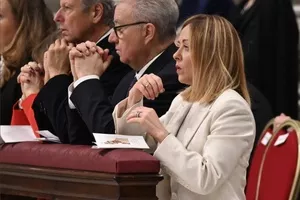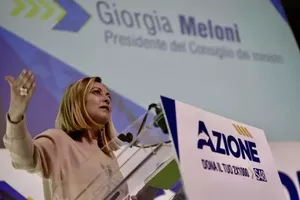“I hope that Giorgia Meloni will seize this opportunity to say without ambiguity and reticence that the Italian right-wing fully reckoned with Fascism when the National Alliance (AN) was born,” Fini said on current affairs talk show Mezz'ora in più on Rai 3.
Fini led AN from its inception in the mid 1990s following the dissolution of the neo-Fascist Italian Social Movement (MSI) to its own dissolution in 2009.
“Once again we have a divisive April 25, under the banner of controversy and fighting, which fortunately is only verbal,” Fini said, referring to the furore that ensued after Senate Speaker Ignazio La Russa (of FdI) was reported on Friday as saying "there is no reference to anti-Fascism in the Italian Constitution".
“Everyone must ask themselves why, and do what they can to avoid being in the same situation in the coming years,” he continued.
This, Fini said, is especially true for the right wing that is now in government, having won an indisputable victory and which some claim has still not reckoned with its past.
On April 25 Italy celebrates the liberation in 1945 from Fascism and Nazi occupation.
In a statement La Russa, who holds the second highest office of State, decried the “falsehoods and insults” against him.
“I remain appalled by the twisting of the truth about my exchange in the Senate cafeteria with two journalists from ANSA and AGI (news agencies), who were joined by a journalist from Repubblica (newspaper),” the Senate Speaker wrote.
“The two agencies immediately reported my words faithfully, and these were, verbatim, 'the word 'anti-Fascism' is not in the Constitution'.
“Furthermore, I added that I recognise myself in the values of the Resistance. I therefore do not have to rectify anything,” he continued.
La Russa also said he was “collecting the conspicuously false and offensive statements and comments” in order to evaluate possible “appropriate action to protect my honourability”.
His comments sparked a barrage of criticism from the centre-left opposition amid calls for him to resign.
Elly Schlein, the leader of opposition centre-left Democratic Party (PD) was among the first to hit back.
“He said anti-Fascism isn't in the Constitution, we say that anti-Fascism is our Constitution,” Schlein told a party meeting at Riano, near Rome.
The National Association of Italian Partisans (ANPI), former Constitutional Court Presidents Giovanni Maria Flick and Gustavo Zagrebelsky and numerous opposition politicians also voiced their dissent.
This is not the first time that La Russa has faced calls to quit from Italy's second-highest office of state after controversial comments relating to Italy's Fascist past.
These include recent criticism of an anti-German Partisan attack in Rome's Via Rasella during World War II that killed 33 soldiers and left 2 civilians dead.
The attack led to the 1944 Ardeatine Massacre in which 335 anti-Fascist prisoners and civilians were murdered by Nazi soldiers as a reprisal.
Partisan Association ANPI blasted La Russa's comments as “shameful” and PD lawmaker Marco Furfaro described them as “the umpteenth attempt to rewrite history, with the despicable aim of putting the Partisan resistance and the Nazis and Fascists on the same level”.
La Russa subsequently apologized for his remarks, saying he had got his history wrong.
On April 25 the Senate Speaker will attend a ceremony at the Altare della Patria (Altar of the Fatherland) monument in Rome before going to a meeting of EU Parliament Speakers in Prague and laying a wreath at the memorial to Prague Spring martyr Jan Palach.
On Friday his agenda also reported he would be visiting the Theresienstadt ghetto and concentration camp 30 miles north of Prague.
ANSA



























